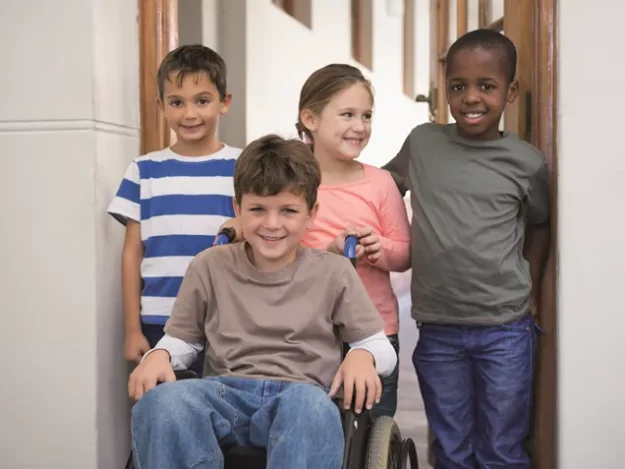
Disability Fostering
Fostering a child with disabilities is so rewarding. At FCA, we provide the very best training and constant support to help you care for a child in need.
There is currently a real need for more foster parents in the UK who are able to foster children with disabilities.
Fostering a child with a disability is an incredibly rewarding way to make a difference to vulnerable children. Though fostering a child with additional needs can at times be challenging, you’ll feel a sense of pride in knowing that every moment of your dedicated care and support is transforming a child’s life for the better.
Fostering children with additional needs
There are many children in the UK care system who have a disability or additional needs. Some children may have co-existing disabilities, or their condition may affect them both physically and mentally.
Some children come into care because their family were struggling to meet their complex needs. As a foster parent who welcomes disabled children, you could be taking care of children with a range of medical conditions. These include:
Who can foster children with disabilities?
Providing you are over the age of 21, have the right to work in the UK and have a spare bedroom suitable for a child, we’d love to hear from you if you’re interested in becoming a foster parent and helping to change the lives of children with disabilities.
During the fostering assessment process, our team will identify your unique skills before going on to use a careful matching process to match you with a child whose needs you can best fulfil so that you can grow successfully together as a family.
Everyone is welcome to apply, regardless whether or not you’ve had medical training or previous experience of looking after children with disabilities. We also encourage you to consider fostering if you yourself have a disability or mental health condition. Learn more about how we’ll support you to foster as a disabled person.
Things to consider when fostering disabled children
There are several things to think about when choosing to become a foster parent for children with complex or additional needs. Ask yourself:
- Do I have the time, energy and resilience to commit to fulfilling all of a child’s needs?
- Am I ready to make home adaptations if necessary to suit a child’s needs? (for example, installing mobility aids)
- Are my own family ready for the big changes which may come along with welcoming a child with additional needs?
- Do I have the outstanding qualities needed to care for a child, including patience, compassion and dedication?
If you have the above qualities, our team would love to hear from you and help you learn more about becoming a foster parent for children with disabilities.
Our training opportunities
We’ll provide you with all the support and training you’d expect from a large and long-established foster care agency. Our training is designed for new foster parents at all levels of experience, so even if you’re completely new to caring for children, you can rest assured that you’ll receive the very best therapeutically informed training and constant support to help you care for the children who will share your home and become part of your family.
If you have professional care experience, such as being an experienced nurse or having worked as a special educational needs teaching assistant, you’ll no doubt come to the role of with a wide range of transferrable skills. We’ll help you hone these in our in-depth training sessions.
Why foster parents choose FCA
When you become a foster parent with us you’ll become part of a supportive team made up of social workers, therapists, childcare experts and other experienced foster parents.
With over 30 years’ experience, we know how important it is to take the time to understand your family’s unique needs. We’ll always be there to support you and the children you look after, being by your side every step of the way to respond to your needs with holistic and tailored support. Some of the ways we support our foster parents include:
- A generous fostering allowance
- Our 24/7 phone line advice service
- Excellent ongoing training opportunities
- Local foster parent support groups
- The support of a dedicated Supervising Social Worker
- The support of a -Participation team
- Free activities and events for families
- Access to our discount scheme

Respite for foster parents
We believe that in order for you to take the best care of children, it’s our job to make sure you’re taken care of. That’s why, alongside our generous fostering allowance, we offer optional short breaks fostering arrangements between your family and another FCA family.
This type of fostering can range from a few hours to a whole weekend and can be a one-off or regular arrangement where the young person in your care will spend time with a familiar, trusted family. Respite arrangements can be beneficial for everyone in your family, giving you as a foster parent some time to rest and feel refreshed while giving your young person the opportunity to widen their circle of support, enjoy new activities and gain new experiences.

Understanding neurodiversity in fostering
Fostering a child with Autism
Fostering a child with Autism Spectrum Disorder (ASD) can come with unique challenges. Every autistic child is unique and will have their own strengths, challenges and needs which they’ll experience to varying degrees. Some autistic children may be non-verbal, while others may experience sensory issues.
Learn more about fostering a child with autism by downloading our free Autism support guide
Fostering a child with ADHD
Attention Deficit Hyperactivity Disorder (ADHD) is thought to affect as many as 5% of children in the UK, with a higher prevalence among children in foster care. There are three different types of ADHD, and not every child displays all of the core 3 symptoms associated with the disorder: hyperactivity, impulsiveness and inattentiveness. Children with ADHD tend to need extra support, especially when it comes to their school life.
Learn more about fostering a child with ADHD.
Fostering a child with FASD
Foetal Alcohol Spectrum Disorder (FASD) is a disorder caused by pre-natal alcohol exposure. There are three core types, and the condition can have both physiological and psychological effects. Children with FASD have experienced organic brain damage in the womb which can cause memory issues, learning differences and developmental delays. As a consequence of this, they often need life-long support to thrive.
Learn more about fostering a child with FASD.
Become a foster parent with FCA today!
If you’re eager to care for a disabled child or young person, get in touch with the FCA team today. Your life-changing decision could have an amazing impact on some of the most vulnerable children and young people in the UK. We’re waiting to hear from you and help you get started!
Speak to our team
Whether you’re ready to start your journey or just want to chat to one of our friendly fostering advisors, get in touch with us today.
Enquiry Form
The company takes the requirements of GDPR seriously in ensuring the privacy and lawful processing of personal data provided to us by you. Please view our privacy notice which explains how the company will manage and use your personal data. This site is protected by reCAPTCHA and the Google Privacy Policy and Terms of Service apply.